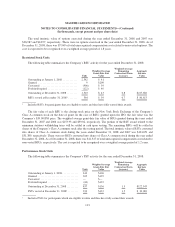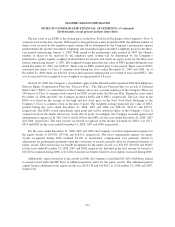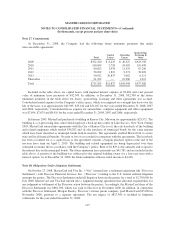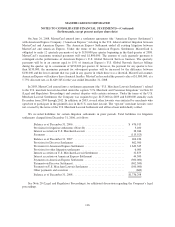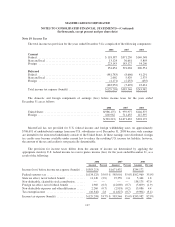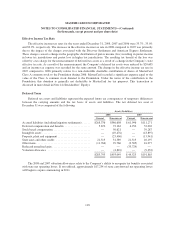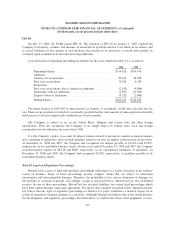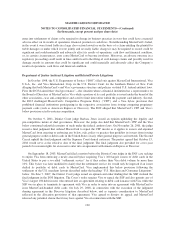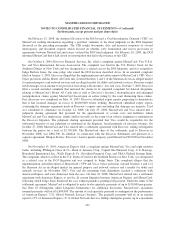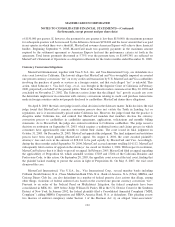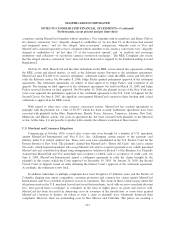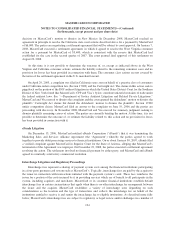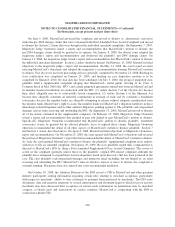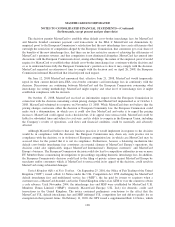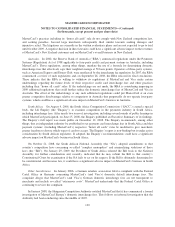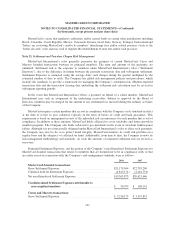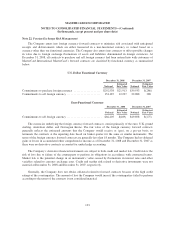MasterCard 2008 Annual Report Download - page 133
Download and view the complete annual report
Please find page 133 of the 2008 MasterCard annual report below. You can navigate through the pages in the report by either clicking on the pages listed below, or by using the keyword search tool below to find specific information within the annual report.MASTERCARD INCORPORATED
NOTES TO CONSOLIDATED FINANCIAL STATEMENTS—(Continued)
(In thousands, except percent and per share data)
conspiracy among MasterCard (together with its members), Visa (together with its members) and Diners Club to
fix currency conversion “fees” allegedly charged to cardholders of “no less than 1% of the transaction amount
and frequently more;” and (ii) two alleged “intra-association” conspiracies, whereby each of Visa and
MasterCard is claimed separately to have conspired with its members to fix currency conversion “fees” allegedly
charged to cardholders of “no less than 1% of the transaction amount” and “to facilitate and encourage
institution—and collection—of second tier currency conversion surcharges.” The MDL Complaint also asserts
that the alleged currency conversion “fees” have not been disclosed as required by the Truth in Lending Act and
Regulation Z.
On July 20, 2006, MasterCard and the other defendants in the MDL action entered into agreements settling
the MDL action and related matters, as well as the Schwartz matter. Pursuant to the settlement agreements,
MasterCard paid $72,480 to be used for defendants’ settlement fund to settle the MDL action and $13,440 to
settle the Schwartz matter. On November 8, 2006, Judge Pauley granted preliminary approval of the settlement
agreements. The settlement agreements are subject to final approval by Judge Pauley, and resolution of all
appeals. The hearing on final approval of the settlement agreements was held on March 31, 2008 and Judge
Pauley reserved decision on final approval. On November 15, 2006, the plaintiff in one of the New York state
court cases appealed the preliminary approval of the settlement agreement to the U.S. Court of Appeals for the
Second Circuit. On June 6, 2007, the appellate court granted MasterCard’s motion to defer briefing until a final
settlement is approved in the MDL action.
With regard to other state court currency conversion actions, MasterCard has reached agreements in
principle with the plaintiffs for a total of $3,557, which has been accrued. Settlement agreements have been
executed with plaintiffs in the Ohio, Pennsylvania, Florida, Texas, Arkansas, Tennessee, Arizona, New York,
Minnesota and Illinois actions, but such an agreement has not been executed with plaintiffs in the Missouri
action. At this time, it is not possible to predict with certainty the ultimate resolution of these matters.
U.S. Merchant and Consumer Litigations
Commencing in October 1996, several class action suits were brought by a number of U.S. merchants
against MasterCard International and Visa U.S.A., Inc. challenging certain aspects of the payment card
industry under U.S. federal antitrust law. Those suits were later consolidated in the U.S. District Court for the
Eastern District of New York. The plaintiffs claimed that MasterCard’s “Honor All Cards” rule (and a similar
Visa rule), which required merchants who accept MasterCard cards to accept for payment every validly presented
MasterCard card, constituted an illegal tying arrangement in violation of Section 1 of the Sherman Act. Plaintiffs
claimed that MasterCard and Visa unlawfully tied acceptance of debit cards to acceptance of credit cards. On
June 4, 2003, MasterCard International signed a settlement agreement to settle the claims brought by the
plaintiffs in this matter, which the Court approved on December 19, 2003. On January 24, 2005, the Second
Circuit Court of Appeals issued an order affirming the District Court’s approval of the settlement agreement.
Accordingly, the settlement is now final.
In addition, individual or multiple complaints have been brought in 19 different states and the District of
Columbia alleging state unfair competition, consumer protection and common law claims against MasterCard
International (and Visa) on behalf of putative classes of consumers. The claims in these actions largely mirror the
allegations made in the U.S. merchant lawsuit and assert that merchants, faced with excessive merchant discount
fees, have passed these overcharges to consumers in the form of higher prices on goods and services sold.
MasterCard has been successful in dismissing cases in seventeen of the jurisdictions as courts have granted
MasterCard’s motions to dismiss for failure to state a claim or plaintiffs have voluntarily dismissed their
complaints. However, there are outstanding cases in New Mexico and California. The parties are awaiting a
123


